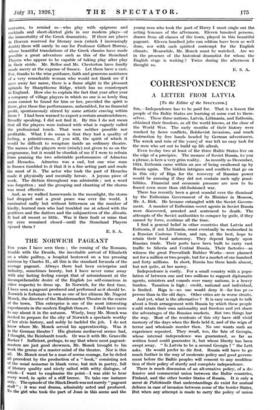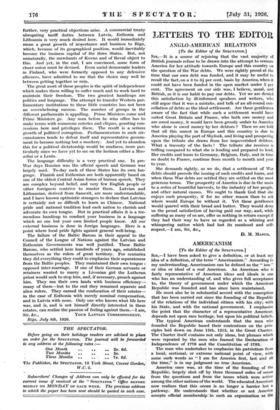CORRESPONDENCE
A LETTER FROM LATVIA
[To the Editor of the SPECTATOR.] SIR,—Independence has to be paid for. That is a lesson the people of the Baltic States are learning at some cost to them- selves. These three nations, Latvia, Lithuania, and Esthonia, obtained their freedom, as all the world knows, at the close of the World War. The early months of their history were marked by fierce conflicts, Bolshevist invasions, and much destruction by free bands headed by German adventurers. The wreck and ruin of the years] of war left no easy task for the men who set out to build up life afresh.
Even to-day two at least of the three Baltic States live on the edge of a precipice. The menace of Soviet Russia, to you a'phrase, is here a very grim reality. As recently as December, 1924, Esthonia came within an ace of being swallowed up by Russia again. The hidden intrigues and conflicts that go on in this city of Riga for the recovery of Russian power would be amusing if they did not contain such ugly possi- bilities. Financial and economic pressure are now to be feared even more than old-fashioned war.
There has recently been a great scandal over the dismissal by the Esthonian Government of its Minister in Moscow, Mr. A. Birk. He became entangled with the Soviet Govern- ment. A number of Esthonian secret agents in Soviet Russia were discovered, arrested and sentenced to death. The attempts of the Soviet authorities to conquer by guile, if they cannot by force, continue all the time.
I find a general belief in other countries that Latvia and Esthonia, if not Lithuania, must eventually be reabsorbed in a Russian Customs Union, and can, at the best, hope to retain their local autonomy. They depend largely upon Russian trade. Their ports have been built to carry vast traffic to Siberia and Central Russia. Their factories—as witness the great Provodinik Rubber Works—were planned not for a million or two people, but for a market of one hundred and forty millions. In short, Russia has these lands almost, but not quite, at her mercy.
Independence is costly. For a small country with a popu- lation of between one and two millions to support diplomatic agents, ministers and consuls over many nations, is a heavy burden. Taxation is high : credit, national and individual, is limited. Riga is—no one would deny it—far less pr perous than in the old days. Other cities are in worse straits. And yet, what is the alternative ? It is easy enough to talk about a fresh arrangement with Russia by which these people could retain their own nationality and freedom and yet share the advantages of the Russian markets. But two things bar the way. Most of the residents of this city have still vivid memory of the days when the Reds held it, and of the reign of terror and wholesale murder then. No one wants such an experience repeated. They recall, too, the fate of GeOrgia, whose internal independence was guaranteed, so far as written bond could guarantee it, but whose liberty has been swept away. " Is Latvia to be a. second Georgia ? " the Lett asks. He would prefer to die first. Russia will have to go much further in the way of moderate policy and good govern- ment before the 'Baltic peoples will consent to any modifica- tion of their policy of sturdy and complete independence.
There is much discussion of an alternative policy, of a de- fensive and commercial union between the Baltic countries, Finland, and the other border States of Russia. It is only a secret de Polichiraelle that understandings do exist for mutual defence in case of invasion between some of the border States. But when any attempt is made to carry the policy of union further, very practical objections arise. A commercial treaty abrogating tariff duties between Latvia, Esthonia and Lithuania is very much desired here. It would immediately mean a great growth of in:portance and business to Riga, which, because of its geographical position, would -inevitably become the business capital of the three States. But, not unnaturally, the merchants of Kovno and of Reval object to this. And yet, in the end, I am convinced, some form of closer union must be devised. Even social democratic leaders in Finland, who were formerly opposed to any defensive alliances, have admitted to me that the choice may well be between getting together or ruin.
The great asset of these peoples is the spirit of independence which makes them willing to suffer much and to work hard to maintain their freedom. The two greatest handicaps are politics and language. The attempt to transfer Western par- liarnentary institutions to these little countries has not been an overwhelming success. The number of groups in the different parliannerits is 'appalling. Prime Ministers come and Prime Ministers go. Any man before he wins office has to make terms with numerous coteries and cliques, granting con- cessions here and privileges there. The result is a serious growth of -political corruption. Parliamentarism in such cir- cumstances tends to defeat itself and representative govern- ment to become nothing but a mockery. And yet to abandon this for a political dictatorship would be madness, more par- ticularly since we have yet to see on the horizon either a Mus- solini or a Lenin.
The language difficulty is a very practical one. In pre- War days Russian was the official speech and German was largely used. To-day each of these States has its own lan- guage. Finnish and Esthonian are both apparently based on one of the Oldest Central Asian forms of human speech. They are complex beyond belief, and very few English people or other foreigners contrive to master them. Latvian and Lithuanian, derived from Sanscrit, are more understandable, and I have known optimistic strangers to declare that Latvian is certainly not so difficult to learn as Chinese. National pride and national tradition lead each nation to cherish and advocate its own tongue. But in practical affairs it is a tre- mendous handicap to conduct your business in a language which no one but your own limited people know. All our external business is done in foreign languages. Here is a point where local pride fights against general well-being.
The failure of the Baltic Barons in their appeal to the Council of the League of Nations against the Latvian and Esthonian Governments was well justified. These Baltic Barons, who settled here hundreds of years ago, established themselves as the rulers of great territory. For centuries they did everything they could to emphasize their separateness from the Baltic peoples. They maintained their own tongue : opposed inter-marriage. If one of their German servants or retainers wanted to marry a Livonian girl the Lutheran priest would seek to stop him, and, if necessary, preach against him. They ran their own lands with business efficiency— many of them—but to the end they remained separate and alien rulers. They earned the confiscation of their estates— in the case of Esthonia with merely nominal compensation, and in Latvia with none. Only one who knows what life here was, and is, and is not himself directly interested in these estates, can realize the passion of feeling against them.—I am,



































 Previous page
Previous page